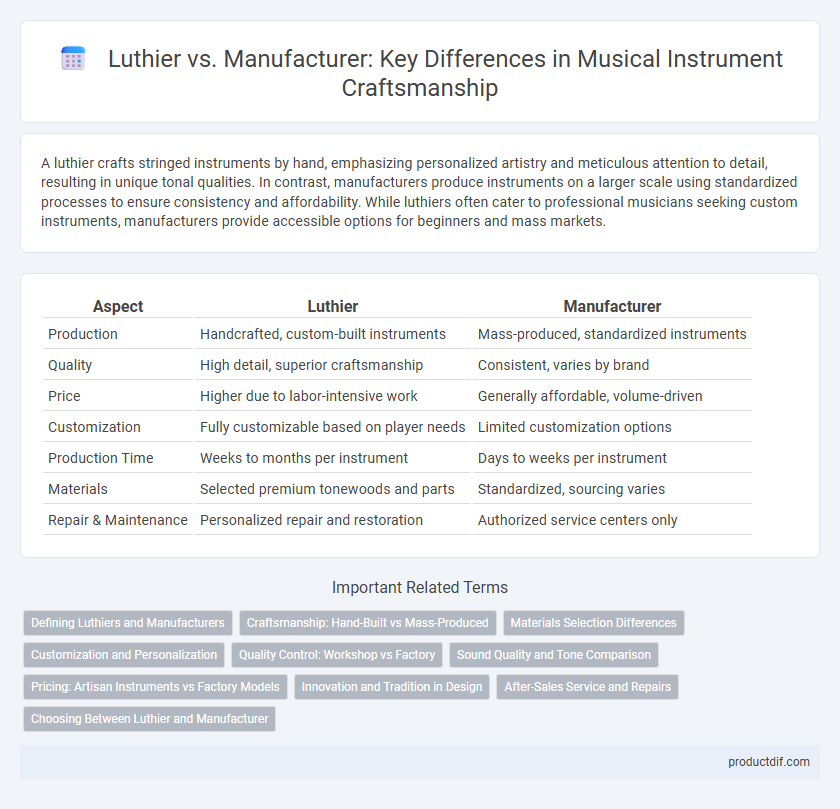A luthier crafts stringed instruments by hand, emphasizing personalized artistry and meticulous attention to detail, resulting in unique tonal qualities. In contrast, manufacturers produce instruments on a larger scale using standardized processes to ensure consistency and affordability. While luthiers often cater to professional musicians seeking custom instruments, manufacturers provide accessible options for beginners and mass markets.
Table of Comparison
| Aspect | Luthier | Manufacturer |
|---|---|---|
| Production | Handcrafted, custom-built instruments | Mass-produced, standardized instruments |
| Quality | High detail, superior craftsmanship | Consistent, varies by brand |
| Price | Higher due to labor-intensive work | Generally affordable, volume-driven |
| Customization | Fully customizable based on player needs | Limited customization options |
| Production Time | Weeks to months per instrument | Days to weeks per instrument |
| Materials | Selected premium tonewoods and parts | Standardized, sourcing varies |
| Repair & Maintenance | Personalized repair and restoration | Authorized service centers only |
Defining Luthiers and Manufacturers
Luthiers are skilled artisans who craft and repair stringed instruments by hand, emphasizing precision, customization, and tonal quality. Manufacturers operate on a larger scale, producing instruments using automated processes and standardized designs to meet mass-market demands. The distinction lies in the handcrafted, bespoke nature of luthier work versus the efficient, high-volume output typical of manufacturers.
Craftsmanship: Hand-Built vs Mass-Produced
Luthiers specialize in hand-built musical instruments, emphasizing meticulous craftsmanship, unique tonal qualities, and individualized attention to detail that often results in superior sound and playability. Manufacturers focus on mass-produced instruments using automated processes to ensure consistency, affordability, and widespread availability. The choice between a luthier's custom creation and a manufacturer's mass-produced model significantly impacts the instrument's character, durability, and value.
Materials Selection Differences
Luthiers meticulously select high-quality tonewoods such as spruce, maple, and rosewood to craft instruments with superior sound resonance and unique character, emphasizing handpicked, often aged materials. Manufacturers prioritize standardized, cost-effective materials like plywood or laminated woods to enable mass production, sacrificing some acoustic richness for consistency and affordability. The choice of materials directly impacts the instrument's tonal quality, durability, and market positioning, defining the distinct approaches between artisanal luthiers and commercial manufacturers.
Customization and Personalization
Luthiers specialize in handcrafted musical instruments tailored to the unique preferences and playing styles of individual musicians, offering unparalleled customization and attention to detail. Manufacturers produce instruments on a large scale, emphasizing consistency and affordability but often limiting opportunities for personalization. Customization by luthiers includes options in tonewoods, neck profiles, and inlays, enhancing both the aesthetic and acoustic qualities tailored specifically to the player.
Quality Control: Workshop vs Factory
Luthiers emphasize meticulous quality control through handcrafted precision and personalized adjustments, resulting in unique, high-quality musical instruments. In contrast, manufacturers rely on standardized processes and assembly lines in factories, prioritizing efficiency and consistency but often sacrificing individual craftsmanship. This workshop-based approach typically ensures superior tonal quality and durability compared to factory-produced instruments.
Sound Quality and Tone Comparison
Luthiers craft musical instruments by hand, allowing for meticulous attention to detail that enhances sound quality and produces a rich, nuanced tone unique to each instrument. In contrast, manufacturers rely on mass production techniques that can lead to consistent, but often less characterful, sound profiles. The handcrafted process of luthiers typically results in superior resonance, dynamic range, and tonal complexity compared to factory-made instruments.
Pricing: Artisan Instruments vs Factory Models
Artisan instruments crafted by luthiers often command higher prices due to meticulous handwork, premium materials, and unique tonal qualities. Factory models tend to be more affordable, benefiting from mass production, standardized designs, and cost-efficient assembly processes. Pricing differences reflect the trade-off between personalized craftsmanship and scalable manufacturing efficiencies.
Innovation and Tradition in Design
Luthiers blend centuries-old craftsmanship with bespoke innovation, creating unique instruments that emphasize traditional techniques and personalized sound quality. Manufacturers leverage advanced technology and mass production methods to deliver consistent, innovative designs that meet modern demands and affordability. The balance between luthier artistry and manufacturer efficiency drives the evolution of musical instruments, maintaining heritage while integrating cutting-edge features.
After-Sales Service and Repairs
Luthiers provide personalized after-sales service and meticulous repairs tailored to each instrument's unique craftsmanship, ensuring optimal sound quality and durability. Manufacturers typically offer standardized after-sales support and warranty services, which may lack the customization needed for intricate repairs. Choosing a luthier guarantees expert attention to detail and preservation of the instrument's original tonal characteristics.
Choosing Between Luthier and Manufacturer
Choosing between a luthier and a manufacturer depends on the desired level of customization and craftsmanship. Luthiers offer personalized, handcrafted instruments tailored to specific tonal qualities and playability, often resulting in a unique sound and feel. Manufacturers provide mass-produced instruments with consistent quality and affordability, suitable for beginners and players seeking standard models.
Luthier vs Manufacturer Infographic

 productdif.com
productdif.com